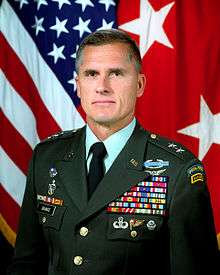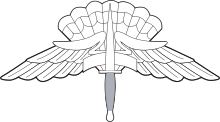David L. Grange
David L. Grange (born December 29, 1947) is a retired United States Army major general. He served with the 101st Airborne Division during the Vietnam War. He was later assigned to Delta Force, commanding a squadron during the invasion of Grenada and was deputy commander during the Gulf War. His last command was of 1st Infantry Division before he retired in 1999.
David L. Grange | |
|---|---|
 Major General David L. Grange in 1996 | |
| Born | December 29, 1947 Long Island, New York, U.S. |
| Allegiance | United States of America |
| Service/ | United States Army |
| Years of service | 1970–1999 |
| Rank | Major General |
| Unit | Delta Force |
| Commands held | 1st Infantry Division 75th Ranger Regiment 1st Battalion, 503rd Infantry Regiment |
| Battles/wars | Vietnam War Operation Eagle Claw Invasion of Grenada Gulf War Yugoslav Wars |
| Awards | Silver Star (3) Defense Superior Service Medal Legion of Merit (2) Bronze Star Medal (2) Purple Heart (2) |
| Spouse(s) | Holly Grange |
| Relations | David E. Grange, Jr. (father) |
| Other work | Chief Executive Officer of Pharmaceutical Product Development |
Early life
Born on December 29, 1947, in Long Island, New York, Grange is the son of retired Lieutenant General David E. Grange, Jr.. He graduated from North Georgia College with a bachelor of science degree and was commissioned a second lieutenant in the infantry. Grange later earned a master's degree in public service from Western Kentucky University.
Military career
Grange was commissioned as an infantry officer in December 1969. Grange first saw significant combat action as a second lieutenant assigned to the 101st Airborne's "Lima" Ranger company in the I Corps Tactical Zone of Vietnam in 1970. This unit was part of the 75th Infantry (Ranger) and attached to the 2/17th Cavalry. As a first lieutenant serving a second tour in Vietnam from 1971 to 1972, Grange was an adviser to the Army of the Republic of Vietnam Airborne Division. Grange was awarded multiple Silver Star awards for heroism in Vietnam including his third award for gallantry in action in February 1972 while serving with the U.S. Airborne Advisory Detachment. Grange returned to Fort Bragg in 1972 and served with the 3rd Battalion, 5th Special Forces Group as detachment executive officer and detachment commander until 1974. That year, Grange completed Flight training and subsequently served with the 158th Aviation Brigade. From July 1978 to 1980, Grange served as infantry company commander, C Company, 1st Ranger Battalion, 75th Ranger Regiment, which supported Operation Eagle Claw in April 1980. In 1981 Grange completed the grueling British SAS Course at Hereford, England then attended the Marine Corps Command and Staff College. In 1982, Grange volunteered for and received assignment to the 1st Special Forces Operational Detachment – Delta (1st SFOD-D), or Delta Force at Fort Bragg, North Carolina. Grange commanded B Squadron during the invasion of Grenada in October 1983 followed by service as unit operations officer. In 1987 Grange volunteered for service in South Korea and took command of the 1st Battalion, 503rd Infantry Regiment, 2nd Infantry Division until 1988. He was then assigned as special-operations officer with Special Operations Command, Washington, D.C. in 1989. Grange attended the National War College and returned to Fort Bragg in June 1990 as deputy commander of Delta Force, in which job he commanded a task force during Desert Storm.
From July 1991 to July 1993, Grange commanded the 75th Ranger Regiment.[1] He then served as deputy commanding officer of United States Army Special Operations Command. After his selection as a general officer, he served as both ADC for support and maneuver in the 3rd Infantry Division at Warner Barracks in Bamberg, Germany.
In 1997, Grange returned to Germany and took command of the 1st Infantry Division and Task Force Eagle in Bosnia,[2] where he was responsible for U.S. forces and operations in Macedonia and Kosovo during the Yugoslav Wars. In 1999, Grange relinquished command of the 1st Infantry Division to John Abizaid and retired from active duty.
Activities in retirement
In December 1999, Grange published a critique of the Army's obsolete way of measuring unit readiness in the Armed Forces Journal. He then led a group of Army officers who wrote a book on improving force structure; Air-Mech-Strike: Asymmetric Maneuver Warfare for the 21st Century. He later served as the executive vice president and chief operating officer of the McCormick Foundation in Chicago.
In September 2005, Grange became the foundation's President and Chief Executive Officer. In May 2009, Grange became CEO of Pharmaceutical Product Development, a Contract Research Organization based in North Carolina.[3] Grange retired as CEO of PPD in May 2011.[4]
Grange founded Osprey Global Solutions, a consulting firm and government contractor that offers logistics, intelligence, medical, security training, armament sales, financial forensics, construction and other services. And also philanthropic services through the Osprey Relief Foundation. Grange also is the CEO of Osprey Armament, which develops specialized weapons and conducts beginner to advanced training at the Osprey Training Center in Council, North Carolina.[5]
In March 2011, just as the Libyan civil war was intensifying, Grange realized that Libya could be a lucrative new market. Tyler Drumheller, a former CIA clandestine officer, who at the time had a consulting firm, advised Grange.[6] Grange, Drumheller and Sidney Blumenthal worked on the Libya memos with Cody Shearer, a longtime Clinton family friend and Democratic political operative for the United States Department of State.[7] Grange provided information operations expertise and "ground truth" geopolitical consultancy to Senior Executives in both public and private sectors. The expeditionary security assessments were conducted throughout Middle East, North Africa and Asia Pacific Rim, providing critical strategic value to public and private sector decision makers. During the Libyan Civil War (2011–present) Osprey Global Solutions sought to build field hospitals in Libya and train the country's national police after the fall of Muammar el-Qaddafi. In 2015, national news reporting on the Secretary of State Hillary Clinton's 2012 email controversy highlighted that Grange was requested by private sector executives to provide his subject matter expertise for Libya.[8][9][10]
Personal life
Grange's wife, Holly, serves in the North Carolina House of Representatives.[11]
Awards and decorations
MG Grange has been decorated for service, to include:
 | |||||
 | |||||
.svg.png) |
 | ||||
   | |||||
 | |||||
- Iran Basic Airborne Wings
- 75th Ranger Regiment DUI
References
- Bryant, Russ (2003). To Be a U. S. Army Ranger. Zenith Imprint. p. 156. ISBN 9781610600330.
- Smith Jr., W. Thomas (4 October 2004). ""The Big Red One" mopping-up after launching a major offensive". National Review. Archived from the original on 29 January 2013. Retrieved 12 October 2010.
- "Archived copy". Archived from the original on 2011-03-16. Retrieved 2017-08-26.CS1 maint: archived copy as title (link)
- "Archived copy". Archived from the original on 2011-02-15. Retrieved 2013-01-06.CS1 maint: archived copy as title (link)
- http://www.wilmingtonbiz.com/insights/david__grange/executive_warrior_leader_course_a_successful_weekend_of_leader_training/406
- https://www.nytimes.com/2015/06/17/us/house-benghazi-committee-examines-the-origins-of-emails-to-clinton.html
- https://www.bloomberg.com/view/articles/2015-10-22/clinton-says-source-of-libya-intelligence-was-a-mystery
- https://www.bloomberg.com/view/articles/2015-10-20/benghazi-panel-to-ask-hillary-clinton-about-sid-blumenthal
- https://www.propublica.org/article/private-emails-reveal-ex-clinton-aides-secret-spy-network
- https://www.nytimes.com/2015/05/19/us/politics/clinton-friends-libya-role-blurs-lines-of-politics-and-business.html
- https://www.carolinajournal.com/news-article/republican-state-rep-grange-announces-bid-for-governor/
External links
| Military offices | ||
|---|---|---|
| Preceded by William F. Kernan |
Commander, 75th Ranger Regiment 1991–1993 |
Succeeded by James T. Jackson |
| Preceded by Montgomery Meigs |
Commander, 1st Infantry Division August 1997 – August 1999 |
Succeeded by John P. Abizaid |